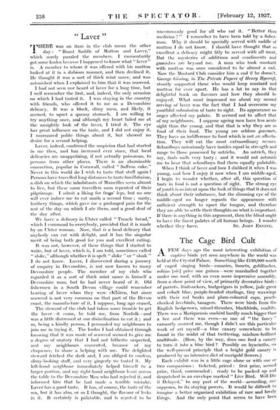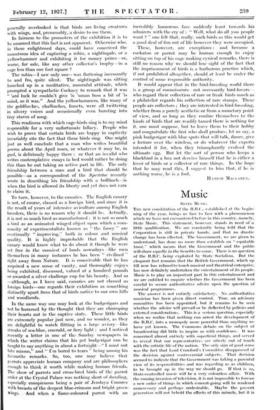The Cage Bird Cult
.FEW days ago the most interesting exhibition of captive birds yet seen- anywhere in the world was held at the Crystal Palace. Something like £150;000 worth of caged. singing birds—canaries, linnets, goldfinches, -robins [sic] price one guinea—were marshalled together -Under one roof, with an even more impressive assembly, from a show point of view, of primarily decorative-birds : of parrots, fruitsuckers, budgerigars in yellow, jade green - and cobalt blue, purple-headed starlings, tiny- waxwings with their- red beaks and plum-coloured caps,- peach- cheeked lovebirds, tanagers. There were birds from the English hedgerows, missel-thrushes; blackbirds, coaltits. :There was a Mariquensis sunbird- hardly much bigger than a bee and there was even—so one of " the fancy " earnestly assured me, though I didn't see this particular work of art myself--a blue canary somewhere to he found in the midst of that twittering, rainbow-brilliant multitude. (How, by the way, does one feed a canary to turn it into a blue bird ? Possibly on hyacinths, on the well-proved principle that a bright gold canary is produced by an intensive diet of marigold flowers.) Each exhibit was in a little cage alone or with one or two companions : ticketed, - priced : first prize, second prize, third, commended : ready to be packed -up and despatched in an envelope marked " Live Bird., Will Die if Delayed," to any part of the worldaccording, one supposes, to its staying powers. • It- would be difficult to. imagine a better organized exhibition of rare -and lovely , things. • And the only -point that seems to have been generally overlooked is that birds arc living creatures with wings, and, presumably, 'a desire to use them; In fairness to the promoters of the exhibition it is to be assumed that this fact is not apparent. Otherwise who, in these enlightened days, could have conceived the monstrous idea of capturing a robin, a nightingale, or a yellowhammer and exhibiting it for money prizes—or, worse, for sale, like any other collector's trophy—in a cage less than one foot square ?
The robin—I saw only one—was fluttering incessantly to and fro, quite silent The nightingale was sitting hunched up in a meditative, mournful attitude, - which prompted a sympathetic Cockney to remark that it was " 'ard luck he couldn't 'give 'is 'uman boss a bit of 'is mind, so it was." And the yellowhammers, like many of the goldfinches, chaffinches, linnets, were all twittering in silvery voices and occasionally even bursting into tiny staves of song.
This readiness with which cage-birds sing is to.my mind responsible for a very unfortunate fallacy. People who wish to prove that certain birds arc happy in captivity invariably cite the fact that these birds sing: One might just as well conclude that a man who writes beautiftil poems about the April roses, or whatever it may be, in gaol, is deliriously happy there : or that an invalid who writes contemplative essays in bed would rather be doing this than be out taking an active part in life. The only friendship between a man and a bird that should be possible—as a correspondent of the Spectator recently wrote in - describing his friendship with a bullfinch—is when the bird is allowed its liberty and yet does not care to claim' it - To turn, however, to the canaries. The English canary is not, of course, classed as a foreign bird, and since it is the result of years of intensive aviculture among English breeders, there is no reason why it should be. Actually, it is not so much bred as manufactured : it is not so much a bird as an animated winged object upon which a com- munity of experimentalists known as " the fancy " are continually " improving," both in colour and musical quality. It is highly improbable that the English canary would know what to do about it though he were set free in the sunniest of lands nowadays —like men themselves in many instances he has been " civilized " right away from Nature. It is conceivable that he. has acquired a new sense of vanity, and thoroughly enjoys being exhibited, discussed, valued at a: hundred pounds or awarded a silver challenge cup for his beauty. And so —although,- as I have said, canaries arc not. classed as foreign birds—one regards their exhibition as something distinctly apart from that of birds-native to our own hills and woodlands.
In•the same way one may look at the budgerigars and not be harassed by the thought that they arc chirruping their hearts out in the captive state. - These little birds are extremely popular just now, and no wonder, as they are delightful to watch flitting in a large aviary—like streaks of sea-blue, emerald, or fiery light : and I noticed recently a letter in one of the Sunday newspapers in which the writer claims that his pet budgerigar can be taught to say anything in about a fortnight--" I must not bite missus," and " I'm bored to tears " being among his favourite remarks. So, too, one may believe that parrots appreciate human company and arc philosophers enough to think it worth while making human friends. The show of parrots and cross-bred birds of the parrot order at the Crystal Palace was nothing short of dazzling, especially -conspicuous being a pair of Jcndaya Conures with breasts of the deepest blue-crimson and bright green wings; And when a flame-coloured parrot with an incredibly humorous face suddenly leant towards his admirers with the cry of : " Well, what do all you people want ? " one felt that, really, such birds as this would get a good deal of fun out of life however they were occupied.
These, however, are exceptions : and because a cockatoo or parrot may be human enough to enjoy sitting on top of his cage making cynical remarks, there is still no reason why we should lose sight of the fact that the imprisonment of birds is a barbarous practice which, if not prohibited altogether, should at least be under the control of sonic responsible authority.
It would appear that in the bird-breeding world there is a group of connoisseurs—not necessarily bird-lovers--- who who regard their collection of rare or freak birds much as a philatelist regards his collection of rare stamps. These people are collectors ; they are interested in bird-breeding, whether from a purely aesthetic or from it monetary point of view, and so long as they confine themselves to the kinds of birds that arc readily tamed there is nothing for it, one must suppose, but to leave them to their hobby and congratulate the first who shall produce, let us say, a pink budgerigar with blue spots that will talk, dance, give a lecture over the wireless, or do whatever the experts intended it for, when they triumphantly evolved the ultimate egg. But let the sort of person who keeps a blackbird in a* box not deceive himself that he is either a lover of birds' or a collector of rare things. In the hope that he may read this, I suggest to him that, if he is nothing worse, he is a fool.











































 Previous page
Previous page